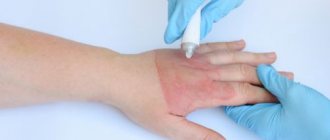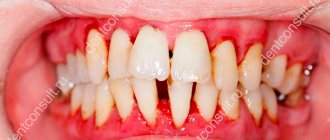There are many methods of gentle treatment of inflammatory processes in the gums. But all of them are not ideal and do not give long-lasting results. A new word in dentistry is the innovative drug “Fagodent”. Its main purpose is to combat purulent and inflammatory diseases. The composition of the gel is unique - it is a whole collection of precisely selected bacteriophages, natural limiters on the path of spread of pathogenic bacteria. They neutralize only pathogenic flora at the site of inflammation. As tests conducted in our clinic have shown, it was thanks to the Fagodent system that we were able to help those patients who were abandoned by traditional medicine. It became possible to cure the most advanced cases in a matter of days. And the result, due to the strengthening of local immunity, is stable and long-lasting.
What is a bacteriophage and why is it used in dentistry?
The word “bacteriophage” has Greek roots and is translated as “bacteria eater.” These are special representatives of the world of viruses that are able to use bacterial cells for their reproduction. Despite their microscopic size, bacteriophages are extremely diverse and include about 13 families. The very appearance of these organisms is unusual. As seen under a microscope, they can look like luxurious crystals, with clearly defined edges, mounted on legs, reminiscent of a spaceship soaring upward. The constituent walls are protein molecules with invaluable genetic information located inside - DNA and RNA. Considering the unique ability of bacteriophages to use bacteria for their growth and development, people have learned not only to cure, but also to provide reliable prevention of various infectious diseases. This makes it possible to almost completely eliminate the use of antibiotics in dentistry.
Advantages of bacteriophages over antibiotics:
- their action is purposeful
- they are able to completely destroy those microbes that traditional medicines have no effect on
- there is no moment of addiction
- do not lead to decreased immunity
- combined with any medications - can be used for prevention
What is Fagodent and how is it used to treat gums?
The innovative system "Fagodent" is a development. Her research made it possible to identify the most common pathogenic bacteria. Suitable bacteriophages were selected for them. The composition of the Fagodent gel is unique. This is a complex of bacteriophages, natural limiters on the spread of pathogenic bacteria, neutralizing only the pathogenic flora that is located at the site of inflammation. They are able to relieve inflammation and normalize the condition of the oral cavity in the shortest possible time. A new word in dentistry allows you to almost completely abandon the use of antibiotics in the treatment of periodontitis and achieve sustainable positive results!
Phagodent gel with bacteriophages (d/cavity 50ml)
A country
Russia
The country of production may vary depending on the batch of goods. Please check with the operator for detailed information when confirming your order.
Purpose
Gel with bacteriophages for gums “Fagodent” (hereinafter referred to as Fagodent) is used to normalize the microflora of the oral cavity. Fagodent helps prevent the development of inflammatory diseases of the oral cavity. Phagodent contains a complex of 81 species of bacteriophages from the collection of LLC SPC "Mikromir", suppressing the growth of current strains of the following pathogenic bacteria: • Acinetobacter baumannii • Aggregatibacter actinomycetemcomitans • Bacillus licheniformis • Bacteroides fragilis • Enterobacter cloacae • Enterobacter kobei • Enterococcus faecalis • Klebsiella pneumoniae • Klebsiella pneumoniae subsp . ozaenae • Propionibacterium acnes (according to the new nomenclature Cutibacterium acnes) • Proteus mirabilis • Proteus vulgaris • Pseudomonas aeruginosa • Staphylococcus aureus • Staphylococcus capitis • Staphylococcus caprae • Staphylococcus epidermidis • Staphylococcus haemolyticus • Staphylococcus warneri • Stenotrophomonas maltophilia • Streptococcus group D (according to the new nomenclature Enterococcus faecium) • Streptococcus agalactiae • Streptococcus pyogenes • Wolinella spp
Practice of using bacteriophages
Bacteriophages (from ancient Greek - “bacteria eaters”) are viruses that selectively infect bacteria: each type of bacteriophage is active only against a certain type of bacteria and is neutral against other species. In clinical practice, bacteriophages are used that destroy pathogenic bacteria without disturbing the normal flora of a person and without interacting with his organs and systems. This allows them to be used in all categories of patients (including newborns, pregnant and nursing mothers), as an effective and safe antibacterial agent for prevention and therapy, as well as in combination with antibiotics. (“Principles of using bacteriophages to combat infections associated with the provision of medical care. Methodological recommendations.” M., 2014). Of particular relevance is the preventive use of bacteriophages in cases where there are no clinical signs of bacterial infection, but there is a risk of their appearance. As a result of the use of bacteriophages, the total number of pathogenic bacteria is reduced and the normal balance of microflora is maintained.
Release form
Gel in a 50 ml bottle with a dispenser and a protective cap.
Compound
• sterile suspension of phage particles in physiological solution; • excipients: purified water, carbopol, calendula extract, katon.
Recommendations for use
In a complex of independent hygiene procedures in the oral cavity: • in healthy people helps prevent the occurrence of bacterial diseases of the oral cavity, • to normalize the microflora of the oral cavity, • for injuries, burns and other diseases of the mucous membrane of the oral cavity, gums, tongue, lips, • during teething. Helps eliminate bad breath as an additional oral hygiene product. Helps prevent the development of bacterial inflammatory diseases of the oral cavity and their relapses, including gingivitis, periodontitis, mucositis, peri-implantitis, chronic aphthous recurrent stomatitis in the presence of risk factors: • general factors: diabetes mellitus, cancer (during radiation and chemotherapy), reduced local and general immunity, fungal and viral infections of the oral cavity, autoimmune and other systemic diseases; • local factors: the use of removable and fixed orthopedic structures: complete or partial dentures, bridges and crowns, including those on implants; in the process of orthodontic treatment using removable (for example, plates) and non-removable (for example, brace systems) devices, surgical interventions in the oral cavity and other dental procedures, including: - curettage of periodontal pockets, flap operations, frenuloplasty and vestibuloplasty, tooth extraction. — after tooth preparation, gum retraction, use of separation matrices, removal of supra- and subgingival dental plaque. As prescribed by a doctor in other clinical situations in which it is important to ensure high antibacterial protection and the absence of side effects. Helps prevent the development of bacterial inflammatory diseases of the oral cavity and their relapses (gingivitis, periodontitis, mucositis, reimplantitis, chronic recurrent aphthous stomatitis). Oral care for gingivitis, periodontitis, mucositis, reimplantitis, chronic recurrent aphthous stomatitis (in the acute period).
Contraindications
Hypersensitivity to the components of Fagodent.
Mode of application
• Fagodent is applied and/or rubbed into the gums.
Fagodent is safe if swallowed. • Phagodent is introduced into the periodontal pocket, the source of inflammation in the area of the dental implant (use a disposable syringe with a blunt cannula). • After using Fagodent, do not rinse your mouth. Do not eat for 40 minutes. IMPORTANT! Do not apply Fagodent into closed areas of inflammation that do not have or have limited outflow of exudate from the lesion (for example, root canals of teeth, sutured wounds, etc.).
Dosage and administration regimens
Professional use: Inject into the inflammation site with a syringe with a blunt cannula after hygienic treatment and therapeutic manipulations and leave for 10-20 minutes without rinsing.
IMPORTANT! At the initial stage, in the presence of an inflammatory focus, it is recommended to use Fagodent more frequently in a dose of 1 ml (one press) at intervals of 1-2 hours until clinical symptoms and pain disappear. The doctor can change the scheme of use, frequency and volume of use of Fagodent, based on the clinical situation.
Interaction
Systemic antibacterial drugs: • Fagodent can be used simultaneously with systemic antibacterial therapy.
Antiseptic, antibacterial and other topical preparations: • The combined use of Fagodent with solutions of chlorhexidine bigluconate 0.05% and 0.2%, hydroxymethylquinoxaline dioxide 2.0%, rinses with triclosan, Persin cleansing foam, smetronidazole gels, chloramphenicol and methyluracil ointments is acceptable. • Consecutive use of Fagodent with an interval of at least 20 minutes is acceptable. after using the following products: - based on octenidine and phenoxyethanol; — based on salts of polyacrylic acid; — hydrogen peroxide solutions; - based on povidone-iodine; — Solcoseryl in the form of a gel/paste.
special instructions
Protect the dispenser from dirt and foreign substances. Clean the dispenser spout and cap from any remaining gel. Always close the dispenser with the protective cap after use.
Conditions of transportation, storage and shelf life
Store at temperatures from 4 to 25°C. Shelf life is 24 months from the date of release, subject to storage conditions. Do not heat, avoid direct sunlight, avoid freezing.
Declaration of Conformity
RU D-RU.AZH23.V.00830 dated 03.20.18, TR TS 009/2011
Manufacturer's name and location
LLC "AVZ S-P", Russia, 141305, Moscow region, Sergiev Posad, st. Tsentralnaya, 1, commissioned by NPC Micromir LLC, Russia, 107031, Moscow, per. Nizhny Kiselny, 5/23, building 1.
Details of the organization authorized to accept complaints from consumers
LLC NPC "Mikromir", Russia, 107031, Moscow, per. Nizhny Kiselny, 5/23, building 1 Tel. www.micromir.bio
Fagodent Gel with bacteriophages for gums, 1 pc., 50 ml, gel for topical use
Locally.
Fagodent is applied to your finger or toothbrush and rubbed into the gums. Direct application of the product into the oral cavity and its uniform distribution with the tongue are allowed (Fagodent is safe if swallowed). After using Fagodent, do not rinse the mouth or eat food for 40 minutes.
A periodontal pocket and a source of suppuration in the area of a dental implant are treated with a fagodent (a dental instrument is used if necessary).
Do not apply Fagodent into closed areas of inflammation that do not have or have limited outflow of exudate from the lesion (for example, root canals of teeth, sutured wounds). The introduction of Fagodent into such lesions due to massive lysis of bacteria can lead to a severe exacerbation of the inflammatory process and/or edema and/or lymphostasis.
Application schemes
In healthy people, incl. to normalize the microflora of the oral cavity, combat unpleasant odor, during teething:
1 ml of Fagodent (1 press) 2-3 times a day after hygiene measures. The duration of the preventive course is from 7 to 14 days. It is recommended to repeat the course every month. The duration of use of Fagodent for preventive purposes is unlimited.
If there are risk factors for the development of bacterial infections of the oral cavity, incl. diabetes mellitus, cancer (especially during radiation and chemotherapy), reduced local and general immunity, fungal and viral infections in the oral cavity, autoimmune and other systemic diseases:
1 ml of Fagodent (1 press) 3-4 times a day after hygiene measures. The duration of the course corresponds to the duration of the risk factor. When the risk factor ceases, a regimen for healthy people is recommended.
When using removable and fixed orthopedic structures, including complete or partial dentures, bridges and crowns, incl. on implants:
1 ml of Fagodent (1 press) 3-4 times a day after meals and subsequent hygiene measures. The duration of the preventive course is 14 days. It is recommended to repeat the course every 1–2 months.
During orthodontic treatment using removable (for example plates) and non-removable (for example braces) devices:
1 ml of Fagodent (1 press) 3-4 times a day after meals and subsequent hygiene measures. Fagodent is used throughout the entire orthodontic treatment. At the end of treatment, a regimen for healthy people is recommended.
Prevention of bacterial inflammatory diseases of the oral cavity and their relapses (gingivitis, periodontitis, peri-implantitis):
The dose of Fagodent is determined by the doctor based on the specific clinical situation. Fagodent is administered with a syringe with a blunt cannula after hygienic treatment and therapeutic manipulations and left for 10–20 minutes without rinsing. If necessary, 2-3 additional procedures are carried out at an interval of 2-3 days. It is recommended to combine it with use at home - 1 ml of Fagodent (1 press) 4-5 times a day after hygiene measures. The duration of the course of home treatments is 21–28 days. The frequency of repetition of courses is as recommended by a doctor.
Prevention of bacterial complications in injuries, burns and other diseases of the mucous membrane of the oral cavity, gums, tongue, lips:
1 ml of Fagodent (1 press) 4-5 times a day after hygiene measures, until signs of injury, burns and/or clinical symptoms disappear. The following is a recommended dosage regimen for healthy people.
Prevention of bacterial complications during surgical interventions in the oral cavity, incl. before curettage of periodontal pockets, flap operations, frenuloplasty and vestibuloplasty, tooth extraction:
before surgery - 1 ml of Fagodent (1 press) 2-3 times a day after hygiene measures for 7 days, canceling 3 days before the start of the intervention. After surgery - 1 ml of Fagodent (1 press) 2-3 times a day after hygiene measures for 7 days, starting from the third day after the intervention. At the end of the course, a regimen for healthy people is recommended.
Prevention of bacterial complications after dental procedures (teeth preparation, gum retraction, use of separation matrices, removal of supra- and subgingival dental plaque):
1 ml of Fagodent (1 press) 4–5 times a day after hygiene measures. The duration of the course of home treatments is from 7 to 14 days. The following is a recommended dosage regimen for healthy people.
As prescribed by a doctor in other clinical situations in which it is important to ensure high antibacterial protection and the absence of side effects:
the doctor determines the scheme of use, frequency and volume of use of Fagodent, based on the specific clinical situation.
At the initial stage, in the presence of an inflammatory focus, it is recommended to use Fagodent more frequently in a dose of 1 ml (1 press) with an interval of 1–2 hours until clinical symptoms and pain disappear. The doctor can change the scheme of use, frequency and volume of use of Fagodent, based on the specific clinical situation.







